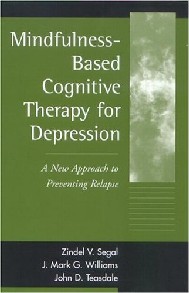| MOUNTAIN
SILENCE |
|
| Issue 9: Spring | |
|
Book
Review
Mindfulness-Based
Cognitive Therapy for Depression: 2002, New York: Guilford Press. 351 pages, ISBN: 1-57230-706-4. Reviewed by Devin Ashwood |
 |
|
I was inspired to train as a counsellor with
a wish to be helpful to people in a response to receiving the Bodhisattva
vow. Since then I have explored many theories and methods that assist
the psychotherapeutic process. So it was with delight that a few
years ago I came across an exciting development in the therapy field.
People were offering Buddhist teachings (in all but name) as a therapeutic
intervention. In discovering that Buddhist principles and techniques
were being developed and validated in a paradigm accessible to the
secular and sceptical West, I began to wonder if my journey into
therapy may be coming full circle. Reading this book helped me to
understand some of the potential and limitations of offering mindfulness
training in the context of therapy.
The book is the story of a group of cognitive behavioural researchers who, seeking to develop a maintenance version of cognitive therapy to offer to recurrently depressed patients, discover the Mindfulness approach developed by Jon Kabat-Zinn. This approach, which was termed by him ‘Mindfulness Based Stress Reduction’ (MBSR) and is elaborated in detail in his book ‘Full Catastrophe Living’, consists of an eight week program teaching mindfulness meditation in a number of contexts to help patients relate differently to chronic conditions and the pain often associated with those conditions. The programme is based on the fundamental Buddhist training principle of relating to phenomena through letting go of both attachment and aversion. The authors describe their journey with compelling honesty and humility; how their approach to treating depression changed as they changed themselves. Realising that teaching mindfulness is not a skill that can be taught out of context, but that they themselves needed to establish their own mindfulness practice if they were to impart its spirit to their clients. The book also describes in detail the programme they developed based on the formulation of Kabat-Zinn. It combines a meditation technique very much in the spirit of the ‘Insight’ or ‘Vipassana’ traditions of Buddhism that have developed in the West with some elements of cognitive therapy, the emphasis being heavily on the mindfulness meditation practice. It termed this model Mindfulness Based Cognitive Therapy (MBCT). Interestingly, the book does not make many references to the historical roots or deeper philosophy of the method. There are only two or three direct references to Buddhism in the whole work. In the closing pages of the book, it does however recommend finding an experienced teacher and refers readers to a number of Buddhist resources including Gaia House. The book’s final section describes a well conducted clinical trial of the model and presents impressive results. For the 75% of clients who had three or more previous depressive episodes, it reduced the chance of a further episode by half in comparison to treatment as usual (primarily antidepressant drugs). I believe the book to be a highly valuable introduction to an equanimity practice that could alleviate much suffering in the world. I thought it was particularly helpful that the authors were scientists who were ‘won over’ to the meditation practice based on an experiential, logical and rational approach and that they developed and tested their model in a way that made it accessible to the mainstream healthcare system. So much so in fact that the National Institute of Clinical Excellence (NICE), who advise all NHS practices, routinely recommend MBCT be offered to people with recurrent depression who are currently in remission. So where does this leave Buddhism? Mindfulness practice seems to me like a great practice for alleviating and even ending suffering. I do feel however that there is more to be said and that is largely about the nature of the self. This aspect is something that these therapies avoid. This is not a problem and I wholeheartedly embrace them, however... I am concerned with the nature of the self, as
at root the belief in a fixed self seems to me the cause of attachment,
aversion and hence suffering. If the nature of the self –
both limitless and ever-changing without any fixed point - is realised
or even if we can develop faith in it, then this opens opportunities
for great compassion, for me this is something worthwhile in a world
where there is so much selfishness and pain. While I appreciate
it is not a practice for everyone, for me, the forms and ceremonies
of Zen highlight the delusionary nature of the small self beautifully
and manifest both delusion and enlightenment in an explicit way
that might otherwise be missed. I pray that all those practicing
mindfulness find this path. Back to front page
|
|